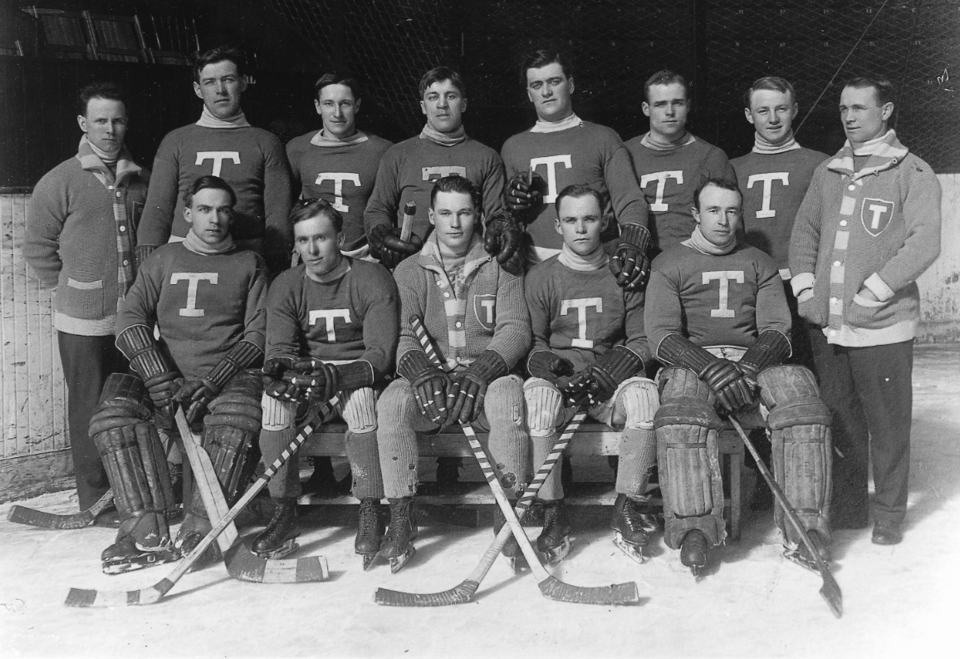Hockey season is underway again, and long-suffering, loyal Toronto Maple Leafs fans continue to hope this time their team will achieve that ultimate NHL victory – winning the Stanley Cup. Over a century ago, a coach from Guelph accomplished that very thing on his way to becoming a Royal City hockey legend.
Richard Leo “Dick” Carroll was born in Guelph on April 28, 1885, the fifth of seven children of Peter and Annie (nee O’Connor) Carroll. He was athletic from an early age and participated in football, lacrosse, baseball and hockey. But it was as a trainer and coach that he would make his mark.
In 1914, Carroll was the chief trainer for the Toronto Blueshirts Hockey Club. His brother Frank was assistant trainer. That year the Blueshirts won the Stanley Cup, defeating the Victoria Aristocrats in three straight games in a best-of-five series. That was Carroll’s first taste of Staney Cup glory, but not his last.
In 1917 he was hired to coach a new NHL franchise in Toronto. Frank was the trainer. The team did not yet have an official name. Unofficially, it was called the Blueshirts. Over the coming years it would be called the Toronto Arenas, the Toronto St. Patricks, and finally the Toronto Maple Leafs. But in Carroll’s time the team was simply called The Toronto Hockey Club.
In that 1917-1918 season, Carroll’s team won the National Hockey Association’s O’Brien Trophy (retired since 1950) and qualified for the championship series against the Pacific Coast Hockey Association (PCHA) champions, the Vancouver Millionaires. His Toronto team included an all-star lineup; future Hockey Hall of Famers Rusty Crawford, Corbett Denneny, Harry Cameron, Jack Adams, Reg Noble and Harry “Hap” Holmes.
Hockey in those days was literally war on ice. It was the era in which legendary Toronto team owner Conn Smythe would say, “If you can’t beat ‘em in the alley, you can’t beat ‘em on the ice.”
It was a philosophy Dick Carroll expounded in the dressing room. He was quoted in the Toronto Daily Star as telling his players before a game against the Ottawa Senators, “Slam right into them from the faceoff and they’ll soon quit. Never mind the puck; get the man, and get him hard.”
The best-of-five series against Vancouver was a tough one, with the teams battling to two wins apiece going into the championship game in Toronto. The Millionaires team included future Hall of Famers Si Griffis, Hughie Lehman, Mickie Mackay, Barney Stanley, coach Frank Patrick and Frederick
“Cyclone” Taylor, the superstar of his day. They played just as mean and nasty as the Toronto boys, as can be deduced from the Toronto Daily Star’s report on the condition of Carroll’s players after game four.
“(Ken) Randall was carried off a cripple, and (Harry) ‘Tank’ Mummery finished hitting on only one cylinder, while Denneny and (Harry) Meeking was (sic) ready for the Red Cross tent, too.”
There were also different sets of rules. The PCHA allowed forward passing, but the new National Hockey League did not. PCHA rules allowed seven players on the ice, while NHL rules allowed six. The series, which was played entirely at Toronto’s Mutual Street Arena, was split between the two sets of
rules for the first four games, with game five played by NHL rules.
On March 30, 1918, with Denneny banging in the winning goal in the third period, one minute after Cyclone Taylor had scored his ninth of the series, Dick Carroll’s Toronto Hockey Club won the NHL’s first official Stanley Cup by a score of 2-1. Oddly, the team’s victory did not get inscribed on the cup until 1948, and then it was as the Toronto Arenas.
The coach from Guelph had made hockey history in Toronto, but the following year his team lost more games than they won and did not make it to the Stanley Cup series. Carroll was fired. However, he was not finished with hockey.
In the 1919-1920 hockey season, Carroll coached the Toronto Canoe Club to the second-ever Memorial Cup. His team included Lionel “The Big Train” Conacher, future Hall of Famer and Canada’s top athlete for the first half of the 20 th century.
Carroll then coached the Pittsburgh Yellow Jackets of the United States Amateur Hockey Association, winning championships with them in 1924 and 1925. Over the next decade he worked in the American Hockey Association, coaching the Duluth Hornets, the Tulsa Oilers, the St. Louis Flyers and the Oklahoma Warriors. He won two championships with Duluth and one with Tulsa.
In the 1935-1936 season Carroll coached the Windsor Bulldogs of the International Hockey League to the finals, only to lose to Detroit.
Outside the hockey world, Carroll coached football and boxing. He was the trainer for Lionel Conacher when the Big Train won the Canadian amateur light heavyweight boxing championship. In 1928 he managed the Guelph Maple Leafs baseball team which made it to the Intercounty championship of the Ontario Baseball Association, but finally lost to the Walkerville Chicks.
He was also a trainer for the Fergus Thistles Lacrosse Club.
Guelph was Carroll’s home base for his whole life. He and his wife Myrtle (nee Kilpatrick), whom he’d married in 1913, lived on Metcalf Street. Whenever Carroll wasn’t out of town, he rarely missed a Guelph Biltmores home game.
Carroll died from heart failure on Jan. 20, 1952. He has been inducted into the Guelph Sports Hall of Fame.



.png;w=120;h=80;mode=crop)